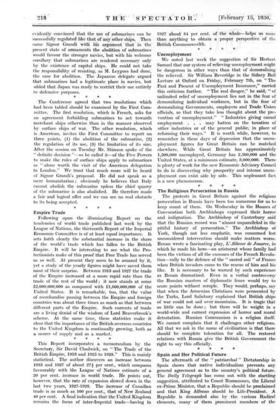The Religious Persecution in Russia The protests in Great Britain
against the religious persecution in Russia have been too numerous for us- to keep count of them. On Wednesday in the Houses of Convocation both Archbishops expressed their horror and indignation. The Archbishop of Canterbury said that the Russian record was "almost unparalleled in the pitiful history of persecution." The Archbishop of York, though not less emphatic, was concerned lest unconsidered intervention should make matters worse. Renan wrote a fascinating play, L'Abbesse de Jouarre, in which he made his hero—an aristocrat whose family had been the victims of all the excesses of the French Revoln, tion—rally to the defence of the " sacred soil " of France when British invaders came to the rescue of him and- his like. It is necessary to be warned by such experience as Renan dramatized. Even in a verbal controversy the Russian masters of diplomatic fence would try to score points without scruple. They would, perhaps, say that when the Armenian Christians were persecuted by the Turks, Lord Salisbury explained that British ships of war could not sail over mountains.. It is tragic that so little can be done ; but there will be weight in a world-wide and earnest expression of horror and moral detestation. Russian Communism is a religion itself. We cannot complain that it challenges other religions. All that we ask in the name of civilization -is that there should be complete toleration for all. The restored relations with Russia give the British Government the right to say this officially. *' *










































 Previous page
Previous page